SAFETY HARBOR, Fla. – Edelweiss Szymanski turns 10 on a Friday in December. She will celebrate the milestone by running a 5-kilometer race in Daytona Beach. The next day, she’s scheduled to compete in a triathlon.
No pizza party. No theme park.
How many 10-year-olds want to run three miles on their birthday, then swim, bike, and run some more the day after?
“This one does,” Lacey Szymanski said, pointing to her daughter with both index fingers.
Meet Edelweiss, a young triathlete on the rise who’s as tough as the flower she’s named after. Meet her brother, Spartacus, too, 14 months younger and just as tenacious.
The SkiSibs, as they are known throughout Florida’s triathlon community.
Their bedrooms are filled with trophies, medals, and plaques – the spoils of reaching the podiums (finishing in the top three) at triathlons, road and bicycle races. The garage of their Safety Harbor home is packed with bicycles.
“We are an active family,” Lacey said.
Lacey and her husband, Jacek, have participated in triathlon relays.
Some mornings, Jacek and the kids can be found riding the bike trails around Pinellas County, waking as early as 3 a.m. so Jacek can get in a long ride before heading to his job as a sergeant with the Pinellas County Sheriff's Office.
If they time it right, and they usually do, the trio will stop along the overlook on the Courtney Campbell Causeway and snack on peanut butter and jelly sandwiches while they watch the sun rise over Tampa Bay.
“We really like watching the sunrise,” Edelweiss said.
She and Spartacus receive Florida education choice scholarships for students with unique abilities managed by Step Up For Students. Edelweiss is dyslexic. Spartacus has attention deficit hyperactivity disorder (ADHD). They are home educated by Lacey, who taught in a private school for 10 years before the family adopted this educational format.
Edelweiss benefits from one-on-one instruction with her mom, while Spartacus is not required to sit at a desk and complete his assignments, something that was an issue when he attended a brick-and-mortar school.
“The scholarship has been a game-changer. It’s awesome that Florida offers this,” Lacey said. “I have my doctorate in education, so I'm really happy that I'm able to help them in the ways that I can and create a curriculum that is specialized to their individual needs, as well.”
The scholarship covers Spartacus’s occupational therapy, as well as art class and piano lessons for Edelweiss. And learning at home allows for flexible schedules. It’s not unusual for Spartacus, an early riser, to complete his math assignments before the sun is up.
The family home borders a wetland, which is ideal for interactive science lessons. It also provided the sticks the kids used to carve their own forks, and the twigs Edelweiss used to create a bird’s nest.
“Her art style isn't cut and dry, like paint a picture of this penguin. It's more abstract,” Lacey said. “That’s the way her brain works. Music, art, and athletics are a lot easier for her. When dyslexia held her back from other things, she kind of poured herself into those things.”
Lacey was pregnant with her daughter, and she and Jacek had yet to settle on a name when she came across a music box she bought during a trip to Germany. It played the song “Edelweiss” from the movie “The Sound of Music.” An edelweiss is a stout flower that grows in the rugged high-altitude terrain of the Alps and the Carpathian mountain ranges in Europe and blooms in the winter.
“I thought, ‘That’s what I want to name my daughter,’” Lacey said.
She and her husband believe that people can become the personification of their names. That holds true with Edelweiss.
“She is very hearty, and it aligns with being a triathlete. She can endure a lot and has a high tolerance for the sport,” Lacey said. “And at the same time, it’s a very beautiful flower. It doesn't look like your normal flower. It's very different and unique, which is what she is.”
And Spartacus? Well, he was making a fist in his first ultrasound.
Jacek said he looked like Spartacus, the ex-slave who became a gladiator and led a rebellion against the Roman Republic in 71 BC.
“He said his name is going to be Spartacus, and I said, ‘Yeah, right. There's no way I would name my son Spartacus.’ And here we are,” Lacey said.
“We do get odd looks when we call his name at a triathlon,” Jacek said. “I’m not saying it’s like yelling ‘Fire!’ in a crowd, but almost.”
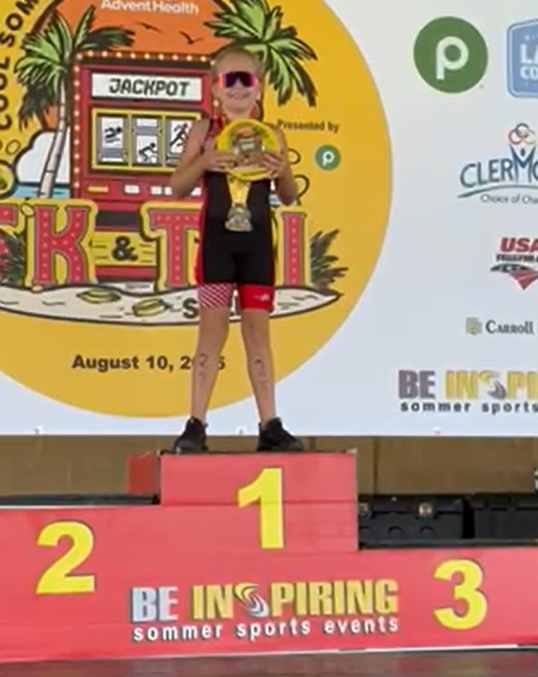
You will often find Edelweiss on top of the podium on race day. (Photo courtesy of the Szymanski family)
Edelweiss competed in her first triathlon when she was 5. The family belonged to a local YMCA, and Lacey saw a post about the race on the morning of the event. So, she woke Edelweiss and asked her if she wanted to give it a try. Edelweiss said yes.
“It gave me something to do,” she said.
The race consisted of one lap in the 25-meter pool, a half-mile bike ride, and a quarter-mile run. Competing on a bike that had pom-poms and a basket on the handlebars, Edelweiss won her age group.
She had one question for her mom when she finished.
“When can we do this again?”
The answer? As often as possible.
She and Spartacus have moved up to sprint triathlons – 400-yard swim, 8.1-mile bike ride, and a 5K run.
The hardest leg for Edelweiss is the run. The best part, she said, is crossing the finish line.
“Because I don’t have to run anymore,” she said.
She’s been known to finish a race in her socks. Once, when she developed blisters and tossed her shoes halfway through the race, and another time when she was having trouble getting them on during the transition from the bike to the run and didn’t want to waste more time.
Jacek was born in Poland and immigrated to the United States at 19. He was an avid cycler in his native country and passed that love on to his children.
Edelweiss and Spartacus also compete in long-distance cycling races, where they are often the top finishers in their 7-11 age group.
“They goof around when they’re going for a ride with dad,” Jacek said. “But something switches when they are in the competitive world. They put on their game face.”
Before being immersed in the world of triathlons, Edelweiss was all about her ballet lessons.
“She was very into ballet, but now she doesn’t want to go back,” Lacey said. “It’s not the same adrenaline rush.”
Their weekends are loaded with triathlons across the state and cycling races as far north as Virginia. Lacey keeps track of the schedule.
“It’s our lifestyle now,” Lacey said. “We’re always in the water or on bikes, doing something like that. Edelweiss doesn’t feel like she’s actually competing. She’s doing what she loves. Spartacus is a ball of fire, too. Both of them together just constantly amazes me about what they're capable of and the grit that they have to compete.”
This is what home education looks like to Vivian McCoy:
Feeding horses in the morning. Mucking stalls, too. Doing the same in the late afternoon, plus whatever else needs to be done at the horse farm where she works part time.
In between, Vivian, who is in the ninth grade, and her sister, Genevieve, second grade, complete their schoolwork on the 15-acre farm where they live with their mom, AnnaMarie, in the Florida Panhandle community of DeFuniak Springs
“I feel I have way more free time to do the things I enjoy,” Vivian said, when asked about the benefits of home education.
That free time includes caring for her own two horses – Blue, a quarter Mustang mix, and Froggy, a Tennessee Walker – and tending to the other animals that live on what AnnaMarie calls a “teaching farm.”
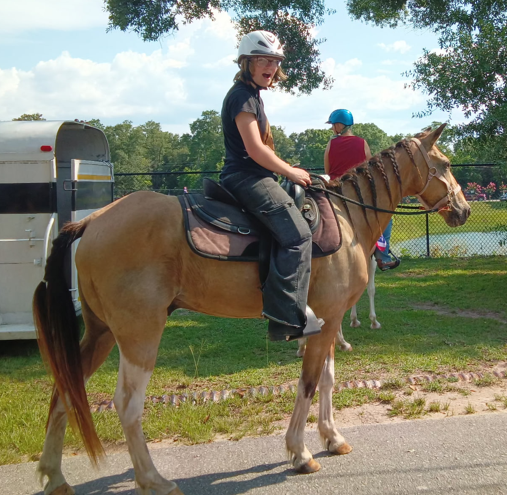
Vivian and Froggy get ready to participate in the Fourth of July parade. (Photo courtesy of AnnaMarie McCoy)
Genevieve looks after the chickens and works in the 2,000-square-foot garden.
There are the core courses, for sure, but there is plenty of hands-on learning for the McCoy sisters in the only educational setting they have known.
Florida education choice scholarships help make it affordable for AnnaMarie, a single mom who works from home part-time as a dietitian consultant.
Genevieve receives the Family Empowerment Scholarship for Students with Unique Abilities (FES-UA). Vivian receives the Personalized Education Program (PEP) scholarship available through the Florida Tax Credit Scholarship Program. Both scholarships are managed by Step Up For Students.
Like FES-UA, PEP is an education savings account (ESA) that gives parents the flexibility to customize their children’s learning to meet their needs. The scholarship, enacted by the Florida Legislature before the 2023-24 school year, has been a financial boon to AnnaMarie.
Until then, she paid out of pocket for the curriculum and supplies needed for Vivian’s home education.
“Pre-scholarship, it was a real struggle meeting all of her goals and being able to present her with things that were going to enhance her interests and her education,” AnnaMarie said. “Although we did it and we got through it, having the scholarship opens up an entire new world for us.
“I can use that money to really enhance what their interests are and what their weaknesses are, or their strengths.”
Like most students who are home educated, Vivian’s and Genevieve’s learning has evolved.
“I’ve gotten a lot more experience over the years to see what works for us,” AnnaMarie said. “These are two very different children, very different students, with very different interests and learning abilities. So, before the scholarship was an option, I definitely did things that were very budget-friendly and utilized anything that was a possible benefit to us that was low-cost, and I still do.”
Vivian is interested in agricultural science and animal husbandry. Hence, Blue and Froggy and her job at the horse farm.
“She's also very artistic,” AnnaMarie said. “She's super, super creative and super artistic.”

Genevieve displays the vegetables she grew in the family's 2000-square-foot garden. (Photo courtesy of AnnaMarie McCoy)
Genevieve, an excellent swimmer, is interested in anything that involves physical activity. She uses part of her ESA for speech-language pathology therapy and the educational tools needed to support that.
While Vivian was “born loving science,” AnnaMarie said, she finds herself trying to find something that will spark that interest in Genevieve. Toward that end, AnnaMarie has “melded” their home into a working farm.
“Everything here presents a teaching opportunity or learning opportunity, and they can see it from beginning to end,” AnnaMarie said.
Genevieve watches the chickens go from egg to chick to chicken – the entire lifecycle. In the garden, she follows the plants from seed to harvest.
“And all the struggles with that,” AnnaMarie said, “the positive outcomes and the negative outcomes and the environmental outcomes.”
AnnaMarie said there are “pros and cons” to every education setting.
“This lifestyle suits them best,” she said. “Having this environment and the flexibility in our schedule really suits their interests and their needs.”
Vivian, 14, is nearing driving age, yet she opted to spend the money she could have put toward a car to buy Froggy.
“She eats, lives, and breathes horse stuff,” AnnaMarie said.
“I’m fascinated by the equine species,” Vivian said. “The power and the majesty they hold. I find it very cool that you can do so many things with them and how they've evolved over the years.”
She was thrilled earlier this summer when she was allowed to ride Froggy in the local Fourth of July parade. It was a big step for both of them, Vivian said. She was able to do something away from the farm with Froggy, and he was able to be around a crowd with all the music and pageantry that comes with a parade.
“I was proud that he didn’t freak out,” she said.
Vivan said she plans to attend college and would like a career in marine biology or one that allows her to work with livestock.
For now, she’s content to work part-time at a local horse farm and care for Blue and Froggy.
And she’s grateful her home education setting allows for that.

Homeschool student William Alexander enjoys a book at The Homeschool Hive, a store in Tampa, Florida, that offers materials and services to families across the Sunshine State and nationally.
TAMPA, Fla. — When you think of homeschooling, what comes to mind? For many families, it’s a journey filled with creativity, flexibility, and personalized learning. Whether you're following a traditional curriculum, taking a hybrid approach, or crafting your own adventure with a Florida K-12 education savings account, parent-directed learning allows families to find the best fit for their children’s needs.
But no matter the style, every family needs support and reliable resources. That’s where The Homeschool Hive comes in. It’s more than just a store. It’s a community that helps families build confidence and find the tools they need to thrive.
A store with a heartbeat
The Homeschool Hive was founded by Kimberlee Tucker, a former classroom teacher and homeschool parent. Her journey began out of necessity. Years ago, Tucker was searching for the right materials and support to educate her daughter, who has unique learning needs. What she discovered was a gap in resources and understanding, especially for parents opting out of a traditional school system.
So, she created what she couldn’t find. Today, parents who visit The Homeschool Hive find a warm, welcoming place that offers curriculum, advice, enrichment tools, and a judgment-free space for families to learn and grow.
“Kimberlee Tucker truly understands how to find the right curriculum for each individual student,” said Lisa Mezzei, who has relied on Tucker, a certified educator, for the past 10 years to conduct annual evaluations for her son, Matthew. “The process has given Matthew a real sense of ownership in his education.”
A store that's truly for everyone
Step inside The Homeschool Hive and you’ll find a thoughtfully curated selection of materials for every subject and learning style. There are full curriculum kits, hands-on science activities, history unit studies, sensory-friendly items, reading support tools, and even educational games and fidgets.
Whether a child is a budding scientist, a reluctant reader, or needs a more tactile learning approach, the Hive has something for everyone. Parents say the best part is personalized support. Tucker and her team listen, guide, and recommend based on each family's needs.
“The Homeschool Hive is such a low pressure, welcoming place,” parent Anissa Stern said. You can visit several times to explore what works best for your child, and the staff, many of whom have children with unique abilities, are incredibly helpful. It’s a fantastic resource for any homeschooling family.”
Kelli Alexander agreed.
“The Homeschool Hive has truly guided our homeschooling journey. It is one of my children’s favorite places to go. Everything is educational, fun, and engaging. I have found so many helpful supplements and resources that reinforce what they have already learned, and I even do their yearly testing through the store.”
Alexander recommends families visit twice, once with their kids, so they can explore and find materials that excite them, and again solo to get one-on-one advice from the staff. “It really makes a difference,” she added

Parent Kelli Alexander, second from left, regularly volunteers at The Homeschool Hive with her family.
Alexander's children especially love the extras they’ve found there, including books, games, and fidgets that make learning more enjoyable. They also look forward to the store’s community events, like the Christmas party, where her kids enjoy volunteering and connecting with other homeschool families.
From frustration to inspiration
Many parents come to The Homeschool Hive unsure of where to begin. It can feel overwhelming trying to choose the right curriculum or learning tools, especially if you’re new to homeschooling or supporting a child with special learning needs. But what sets the Hive apart is its heart.
Tucker and her team meet families where they are. They provide encouragement, advice, and solutions that are realistic and effective. Parents leave feeling seen, heard, and empowered to take the next step in their child’s education.
Tucker’s daughter, the inspiration behind it all, has since graduated from high school and is now engaged to be married. That journey of learning and growth is something Tucker says she wants for every family that walks through her doors.
A store that goes beyond the basics
Tucker doesn’t just stock big brands. She travels to toy and education conferences across the country, sourcing creative and engaging tools from family-owned and independent companies. These unique items aren’t just educational; they’re fun, hands-on, and often perfect for gifts or seasonal enrichment.
For those not local to Florida, The Homeschool Hive ships nationwide and has become a go-to resource for families across the country. Families don’t have to be on a Florida education choice scholarship to purchase from the store. Everyone’s welcome. With growing demand, Tucker is considering opening a second location soon. She recently expanded the staff to include Bernadette Bee.
"She is my new shop dog," Tucker said. "She is therapy trained and training to be a service dog for me."
Perfectly timed for the educational shift
As school choice continues to expand in Florida and across the country, families are exploring new ways to educate their children. The Homeschool Hive is perfectly positioned to support that shift. Whether you're a brand new homeschool or scholarship parent or several years into the journey, this is the place where guidance, resources, and inspiration come together.
“If you are just starting your homeschooling journey, you have to visit the Homeschool Hive first," parent Lisa Mezzei said. "It is the perfect place to get support, explore options, and find what really works for your child.”
Seppie Furlano gets dirty at school. It happens. He’s 8, he’s a boy, and one day a week, his classroom is a mixture of trees, shrubs, dirt, and mud.
And there’s a creek.
Seppie and his classmates, who include his 10-year-old sister, Luciana, climb trees, discover tadpoles, and build small boats out of twigs and leaves to float down the creek.
Luciana’s mom reports that her daughter doesn’t get quite as dirty as her brother, but she has just as much fun. Together, they explore and learn about the great outdoors and all it has to offer at Curious and Kind, a nature-based, hybrid school located near their Sarasota home.
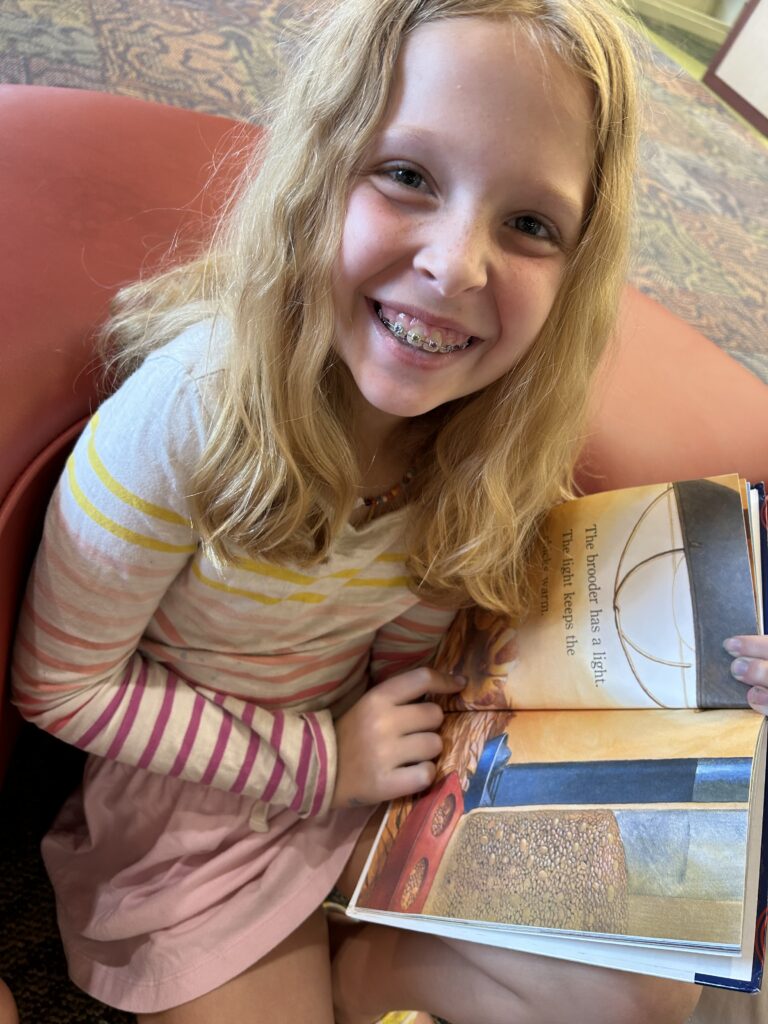
Luciana is dyslexic, but with the help of an online reading tutor available with her ESA, she is now able to read books.
The school, started two years ago by Justine Wilson and her husband, Chris Trammel, is now part of the hybrid learning, homeschool experience that Kristina and Dominic Furlano designed for their children with the help of education choice scholarships managed by Step Up For Students.
“I absolutely love the scholarship,” Kristina said. “The scholarship has made our homeschooling journey what it is today. My kids are absolutely thriving.”
Actually, Kristina balks a little at the word homeschooling, because Luciana and Seppie learn both inside and outside the home.
“I feel like that is the complete opposite of homeschooling,” she said.
The scholarships are education savings accounts (ESA) that allow the Furlano’s flexibility to tailor the homeschool curriculum toward each child’s needs and interests. They have joined the growing number of parents in Florida who are taking the hybrid route, finding educational environments outside the home to give their children something they can’t experience inside the home.
Parents are supplementing in-home learning by sending their children to educational environments that specialize in such activities as music, fashion, cooking, robotics, athletics, and nature. Call it “à la carte learning.”
Curious and Kind offers four different programs for different age groups, from “walking ages” to teenagers. Depending on the program, families can enroll what the school calls their “explorers” one, two, or three days a week. (Read more about the school here.)
“We are part of a homeschool family's menu that they designed specifically for their child,” Justine Wilson said.
Luciana takes sewing and musical theater classes, while Seppie attends a local STEM program that offers classes in Lego robotics. On Tuesdays, the two can be found at a local skate park with other homeschooled children. Some parents use skateboarding as a physical education requirement. Afternoons are often blocked out for reading tutors.
This summer, the two will participate in several camps, more outdoor fun at Curious and Kind, and a baking camp. If all goes well, baking camp will turn into baking classes during the 2025-26 school year. Kristina has already expanded her children’s outdoor learning for next year by enrolling them at Curious and Kind for two days a week.
“I like my kids to be out of the house, but only for a couple of days a week. I don't want them gone five days a week,” Kristina said. “If they are gone two or three times out of the week, it gives them some structure, and they get to make friends, and I get to do what I need to do while they're gone.”
Luciana originally attended a local private school. She is dyslexic, though, and that hindered her learning. She had to repeat the first grade. She also suffered from anxiety at school. So, Kristina and Dominic decided homeschooling was the best option.
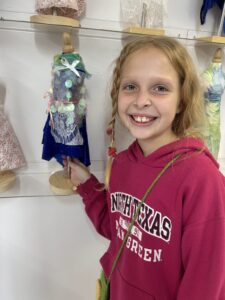 Because she is dyslexic, Luciana qualified for the Family Empowerment Scholarship for Students with Unique Abilities.
Because she is dyslexic, Luciana qualified for the Family Empowerment Scholarship for Students with Unique Abilities.
Because Seppie is homeschooled, he qualified for the Personalized Education Program (PEP) scholarship.
The flexibility of homeschooling allows Kristina to schedule online reading tutors for the afternoon, when she feels Luciana and Seppie are more receptive to video lessons. It works.
“My daughter read her very first book two weeks ago, so that was amazing,” Kristina said. “We were all so worried about this child, and then she read this book. She’s on her sixth book now. I mean, they're all the very beginner books, but she's got it, and she's putting it together, and it's just been really helpful to have the tutor.”
The ESAs pay for homeschool curriculum, reading tutors, a ton of art and sewing supplies, sewing and outdoor classes, musical theater, and summer camps.
Luciana has learned to sew by taking classes from a mother who also homeschools her children.
“Luciana is using a real sewing machine. She designs. She cuts the fabric out, picks her fabric, picks her string, and sews the entire thing,” Kristina said.
Luciana has made pajama pants, a skirt, a hat, bags, and sleeping masks.
“They do fashion shows,” Kristina said. “She has a little portfolio.”
Because of Luciana’s dyslexia, Kristina said a brick-and-mortar school will never be a good fit for her daughter. She has no intention of sending Seppie to one, either.
“The beauty of homeschooling is to not make your child have this cookie-cutter education that society wants your children to have,” Kristina said. “Now we have this generation of home-schooled children who are going to take over the world with their creativity. They're not going to work 9-to-5. They’re going to be entrepreneurs.”
 For the first time in Florida’s history, more than half of all K-12 students are enrolled in an educational option of choice. During the 2023–24 school year, 1,794,697 students, out of the state’s approximately 3.5 million K-12 population, attended schools outside their zoned neighborhood assignment.
For the first time in Florida’s history, more than half of all K-12 students are enrolled in an educational option of choice. During the 2023–24 school year, 1,794,697 students, out of the state’s approximately 3.5 million K-12 population, attended schools outside their zoned neighborhood assignment.
Since the 2008–09 school year, Step Up For Students, in collaboration with the Florida Department of Education, has tracked enrollment across a variety of choice programs. While methods and program structures have evolved, 2023–24 marks a milestone: more than 50% of Florida’s students are now learning in environments selected by their families.
The Changing Landscapes report draws from Florida Department of Education data and removes, where possible, duplicate counts to provide a clearer picture of school choice participation. For example, it adjusts for home education students supported by the Family Empowerment Scholarship for Students with Unique Abilities (FES-UA) and eliminates double-counted students in career and professional programs. It also excludes prekindergarten students in FES-UA and programs like Voluntary Pre-Kindergarten (VPK), as the report focuses solely on K–12 education.
While many families still choose their neighborhood public schools, Florida’s education system now offers a broad range of options to meet diverse student needs. Public school choice remains dominant, occupying four of the top five spots in overall enrollment. Charter schools are the most popular option, followed by district open enrollment programs, career and professional academies, and Advanced International Certificate of Education (AICE) programs for upperclassmen.
On the private side, the 2023–24 school year marked a historic shift: For the first time, a single scholarship program now serves more students than all private school families who pay tuition out of pocket.
In total, over 116,000 additional students enrolled in choice programs compared to the prior year. The Family Empowerment Scholarship for Educational Options (FES-EO) and the Florida Tax Credit Scholarship (FTC) saw the greatest growth, along with AICE and FES-UA. Altogether, scholarships for private and home education increased by approximately 142,000 students, while private-pay and non-scholarship home education enrollment declined, likely due to the expanded availability of financial aid.
Among public-school options, magnet and district choice programs saw slight declines, with 28,000 and 8,447 fewer students, respectively. Still, public-school choice remains strong: 1.1 million of Florida’s 2.9 million public school students (40%) are enrolled in a choice-based public option.
Altogether, nearly 1.8 million students attend a school chosen by their parents or guardians. This shift reflects a fundamental transformation in Florida’s educational landscape—one where families are increasingly empowered to find the best fit for their children.
But with so many students opting for alternatives to their zoned public schools, it raises an interesting question: What about those who stay? If families are surrounded by options and still choose their assigned public school, isn’t that a choice, too? In that light, Florida may already have a 100% choice system, because staying is just as much a decision as leaving.
Rather than a battle between public and private education, Florida is showing how both sectors can coexist and thrive, working together to provide high quality learning opportunities for all students. The future of education isn’t one-size-fits-all; it’s about ensuring every family has access to an option that fits their child’s unique needs. In Florida, that future is already here.
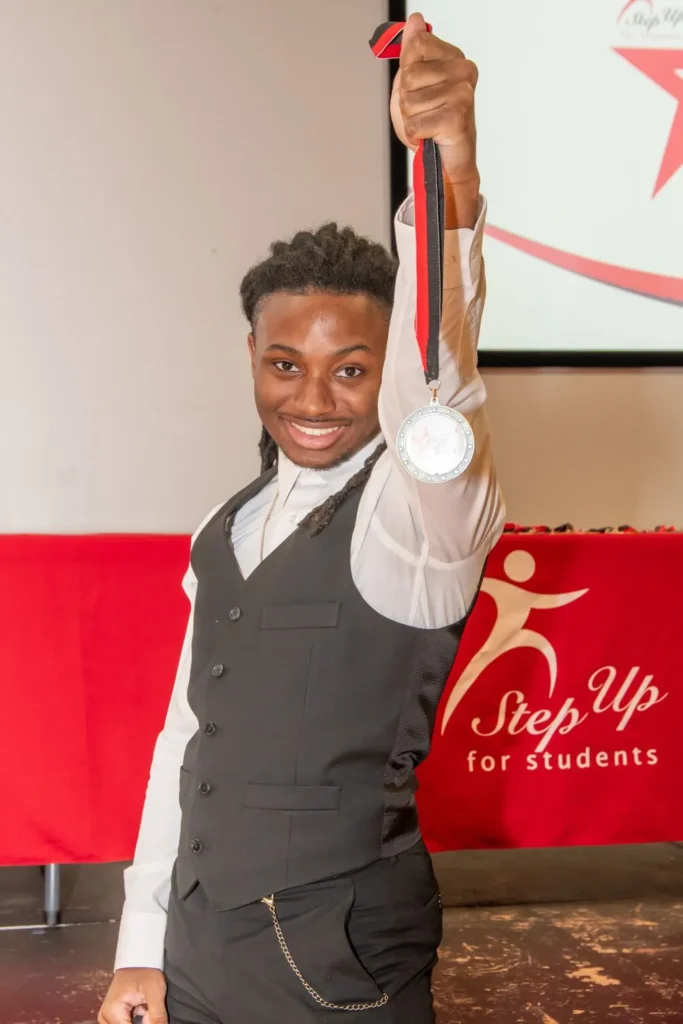
Ronald Hamilton shows off the medal he received at Step Up For Students' annual Rising Stars Awards event in February.
TAMPA, Fla. – The poem is a father’s message to his son, that everything they do together will be a memory someday.
"I’m going to love and hold you until you’re grown
for in a blink you'll be on your own."
Barbara Hamilton wrote the poem for her son, Ronald, when he was in the seventh grade. He recited it at the end-of-the-school-year celebration for homeschoolers. It’s based on Ronald’s interactions with his dad, Ron Sr. Everything the Hamiltons have done for their only son has been to prepare him for the time he will be off on his own, and that included his education.
Unhappy with his treatment by a classmate and what Barbara said was a lack of concern from administrators at his assigned district school near the family’s Tampa home, Barbara began homeschooling Ronald when he was in the second grade.
“Homeschooling wasn't good only for him, it was great for us because it exposed us to a totally different world and allowed us to think outside of the box,” Barbara said. “We don't have to go with the status quo. Yes, the government says your child must be educated, but there's another way you can do it.
“It just opened up a different world for us, and I have no regrets.”
Now a high school senior, Ronald, 17, uses a Personal Education Program (PEP) scholarship that comes with the Florida Tax Credit Scholarship (FTC), managed by Step Up For Students.
The scholarship is an education savings account (ESA) for students who are not enrolled full-time in a public or private school. It allows parents to customize their children’s education by allowing them to spend their scholarship funds on various approved, education-related expenses.
Barbara is thankful for the scholarship, which was created in time for the 2023-24 school year. But, like many parents who have homeschooled their children for years, she wishes it had been created a few years earlier.
“(Homeschooling) can pinch your wallet,” she said.
Yet, she is 100% confident that homeschooling was the right educational choice for Ronald. They tried traditional schools for kindergarten and first grade, but Ronald was bullied.
He also had a hearing impairment that went undetected until the fifth grade, when a homeschool evaluator raised her suspicion to Barbara. Barbara and Ron Sr. had suspected this for years, but doctors couldn’t find a defect. A hearing specialist in Colorado did, and Ronald now wears an ear filter that buffers loud sounds.
“Ronald’s hearing developed a little differently,” Barbara said. “Sound to him was extra loud. I noticed he covered his ears every time there was a loud noise.”
This made it difficult for Ronald to correctly hear what was being said in class. Barbara said the teacher, in a sign of indifference to Ronald’s struggle, moved his seat away from the other students, isolating him from his classmates, and adding to his trauma.
“He would come home, and his spirit would be downtrodden,” Barbara said. “So, I took it upon myself and pulled him out of that school. The Lord didn’t give him to you. He gave him to me, so I took the chance of educating him myself.
“We started on our journey, and it was peaceful. The house was happy. Ronald was happy.”
“Well,” Ronald said. “I'm going to be honest, it was kind of hard at times, but I got through it, and long term, it was actually beneficial.”
The hard times, Ronald said, came from the textbook Barbara initially used for her lessons. It was big and somewhat intimidating.
“It was gruesome,” Ronald said.
Barbara made the switch to Florida Virtual School. Ronald enjoyed the interaction with other homeschoolers. In the fifth grade, Ronald was introduced to the world of robotics.
“That motivated me to learn more about technology,” he said.
Ronald joined Tampa Bay HEAT (Homeschool Education Activities Team), where he met fellow homeschoolers and participated in sports and extracurricular activities.
He also became a member of a storytelling group in Hillsborough County. Barbara and Ron Sr. saw that as another step in their son’s development, because it allowed him to build the confidence that comes with speaking in front of groups.
So, when the Tampa Bay HEAT was looking for a student to speak at the end-of-year event, the coordinator, aware of Ronald’s storytelling ability, asked Ronald to be the guest speaker. After looking through family photos that reminded her of the interactions between Ron Sr. and Ronald, Barbara decided to write the poem, "A Father's Eyes."
“It dawned on me that Ronald is going to be mimicking with his children everything he does with his dad, and I was like, ‘Man, I need to capture that.’ So, I captured it,” Barbara said.
Ronald can still hear the reaction of those at the event.
“Everyone cheered,” he said.
And he can still recite some of the lines.
"Now, catch the ball. Run, jump, laugh, & play
for this will be a memory one day."
Ron Sr. said the extra time he spent with Ronald is one of the benefits of homeschooling. For the physical education requirement, Ron Sr. taught Ronald how to play golf and tennis. In their spare time, the two searched the ponds, lakes, and streams near their home for the perfect fishing spot.
“We haven’t found it yet,” Ronald said.
“I can say this,” Ron Sr. said, “the more time with his family gave us more time to teach him family values and the in-between things about school, how to live, how to treat other people.”
PEP allowed Ronald to dual enroll at Hillsborough Community College. He will explore further education options once he completes his liberal arts degree. Right now, Ronald is leaning toward a career as an electrician. Ron Sr. thinks his son will one day own his own business.
Ronald said it’s possible that he could start his own business as a side hustle.
“That way I’ll have active and passive income,” he said.
James Herbert, Ronald’s eighth-grade science teacher from the Florida Virtual School, wrote a recommendation for Ronald to receive the Super Senior Award at Step Up For Students’ annual Rising Star event.
He wrote that Ronald has an “exemplary work ethic,” “high moral character,” and is “driven to succeed.”
“I am confident Ronald will continue to uphold these values as he takes on new challenges and opportunities,” he wrote.
This is what the Hamiltons wanted when Barbara exercised her right to education choice and homeschooled Ronald.
"I’m amazed at whom you’ve become,
Simply viewing life from the eyes of my son."
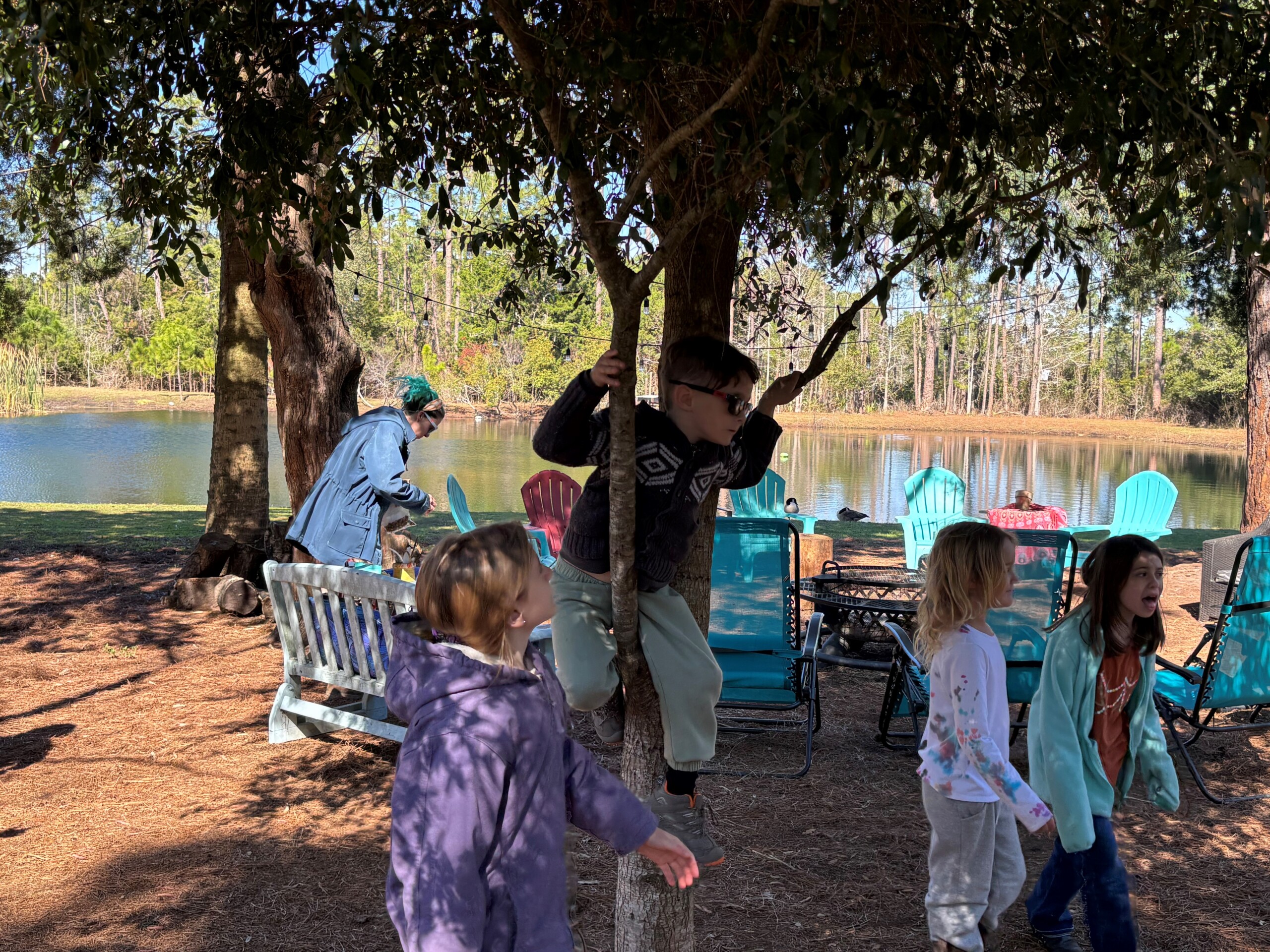
Climbing trees and playing in the rain are integral parts of the day at Wild Oaks Explorers, a nature-based program that focuses on student-directed learning.
FERNANDINA BEACH, Fla. – Millions of students in American public schools are lucky if they get 30 minutes of recess a day. But the students at Wild Oak Explorers spend hours at a time roaming an 8-acre oasis of pines, ponds, and trails not far from the Georgia line.
On a recent, typical day, they surveyed the property to make maps, picked apart pinecones for make-believe tea, fed wax myrtle to a herd of goats – and did whatever else their imaginations spurred them to.
“This is their playground,” said Wild Oak founder Stacey Tappan.
Tappan is a certified forest teacher who started Wild Oak in 2019. It’s technically an enrichment provider, not a school. It serves students who are homeschooled, or those doing parent-directed education, outside of full-time schools, with flexible, state-supported choice scholarships.
Students attend two or four days a week, for four hours at a time. They range in age from toddlers to teens.
Tappan and her fellow teachers organize some educational activities for the students, like the land survey. There are also some daily rituals, like morning “sit spots,” where the students start the day quietly observing their surroundings.
But most of the learning is directed by the students themselves. If the students want to climb trees, they climb trees.
“And if it rains,” Tappan said, “they play in it.”
Tappan began gravitating to nature as a classroom 12 years ago.
She saw benefits for neurodivergent children, including her now-14-year-old daughter, Jacqueline. For many students, the freedom to move – to stand, to wiggle, to take a walk – can reduce anxiety and recast behavior that might be viewed as problematic in a typical classroom, Tappan said.
She also saw benefits for all children – a natural way, literally, to foster everything from character, curiosity, and creativity, to problem solving and social skills.
Just as important, Tappan saw learning outdoors as fundamental to cultivating a healthy environmental consciousness – and, by extension, a healthier, more sustainable planet. “We teach respect for all living beings,” says the school’s website, “and how to minimize our impact on the earth.”
For most people, Tappan said, “Nature has become a backdrop. You’re moving from x to y to z and not actually paying attention. That’s the purpose of the sit spots.”
“If kids don’t learn to love nature, who’s going to save it?”
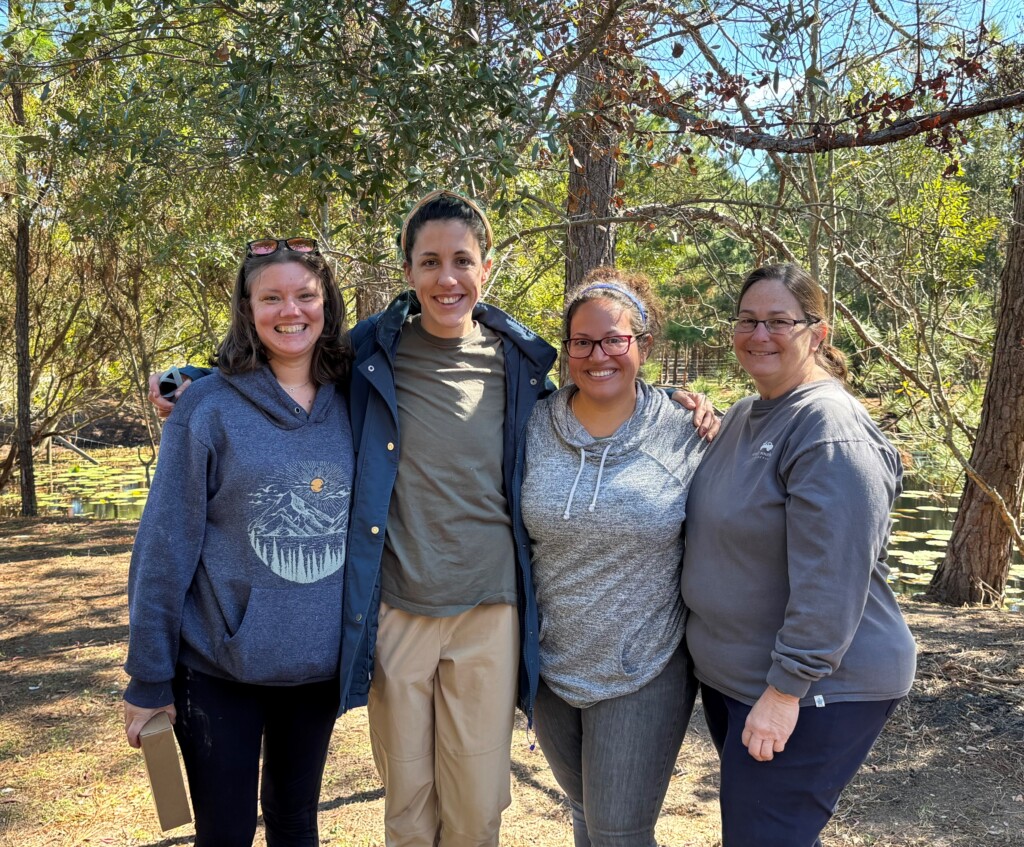
From left to right, Ashley Murphy, forest families guide; Nicky Newton, art curiosity guide; Vanessa Munshower, curiosity guide; and Stacey Tappan, founder/facilitator.
Tappan and Wild Oak are not anomalies, even if narratives about “school choice” fueled by choice opponents seek to erase them.
The Natural Start Alliance reports the number of forest school pre-schools more than doubled between 2017 and 2022, to about 800. I don’t know if anybody is keeping official tabs on the broader group of “green schools.” But this nature school founder and writer has a pretty good handle on them, judging by the 1,000+ schools she lists in the U.S., including 40 in the Sunshine State.
Nature schools like this one, this one, and this one have long been part of the private school landscape in Florida. And as education choice has expanded, so have they. (See here, here, and here.)
Tappan started with five students from three families. Now she’s serving 29 students from 20 families. Virtually all of them use choice scholarships.
“Being outside is so important to me,” said Dru Clark, who has two children at Wild Oak using the Personalized Education Program scholarship. “I want them to get the health benefits. I want them to connect with nature and learn about it.”
Tappan wanted the same for her children.
She grew up across the street from one of the Jacksonville area’s biggest malls, yet still spent endless hours catching “crawdads” in nearby creeks.
She knew today’s kids rarely had such experiences, so when she couldn’t find a school that opened the door to those activities – stop me if you’ve heard this before – she created it. At the time, Tappan had spent more than a decade in health care management.
“I tell parents all the time, ‘If you don’t see the school you want, create your own,’ “ Tappan said.
Wild Oak Explorers is based at Jaybird Hammock Farm, 45 minutes north of Jacksonville. Most of the property is wooded and home to wild animals endemic to North Florida. But there’s also a menagerie of farm animals, including chickens, turkeys, ducks, two donkeys, one mule (a diva named Buttercup) and at least 15 friendly goats.
Tappan and the other teachers joyfully use all of it for their programming.
For the Great Backyard Bird Count, the students relied on binoculars and field guides to identify bird species, then drew or painted them in nature journals. Over the next few weeks, an official with a local 4-H group will lead lessons in embryology, using eggs from the farm. A wildlife rehabber is also set to visit soon – and to bring a partially paralyzed raccoon she rescued.
None of this, though, holds a candle to Wild Oak’s central feature: Long stretches of free play.
With play comes learning – and way out here, some of the lessons are especially valuable, as Wild Oak parents will be the first to tell you.
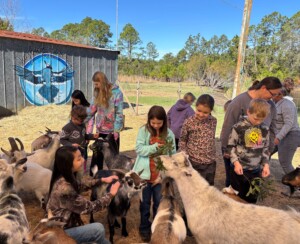 “There’s strength in risky play like climbing trees,” said Katie Ernst, whose 5-year-old daughter Rayah also uses a PEP scholarship at Wild Oak. “They learn their own strengths, their own bodies, what they can and can’t do. They learn how to trust themselves. They gain confidence.”
“There’s strength in risky play like climbing trees,” said Katie Ernst, whose 5-year-old daughter Rayah also uses a PEP scholarship at Wild Oak. “They learn their own strengths, their own bodies, what they can and can’t do. They learn how to trust themselves. They gain confidence.”
Wild Oak represents other important trend lines that are especially pronounced in Florida, which leads the country in education choice.
Again, it’s not a school. In fact, Wild Oak is now one of more than 14,000 providers outside of schools that are part of public education in Florida.
As tens of thousands of families flock to a la carte learning, they’re accessing providers like Wild Oak, but as only one piece of a program they custom build themselves. Both Clark and Ernst, for example, use their PEP scholarships for multiple programs and providers.
Wild Oak is also another distinctive example of how the expansion of choice in Florida offers something for everybody. The families, educators, schools, providers, and communities who are embracing choice are incredibly diverse along multiple dimensions – and becoming more so every day.
“I know this program isn’t for everybody,” Tappan said. “That’s okay.”
But for those who want it, it’s there.
DELTONA, Fla.– Of all the skills Yaeli “Yaya” Santos could have picked to earn a grade in that portion of her eighth-grade physical education class, standing on her head seemed the easiest.
Understand this: Yaya does not claim to be athletic in the least, but she had to master a skill, and “How hard is a headstand?” she thought.
So, there she was, hands on the mat, feet pointing toward the ceiling.
Yaya was about to earn a passing grade when she lost her already tenuous balance, causing the mat to slip from under her. The top of her head slammed into the now uncovered hardwood floor.
“Not my finest moment,” Yaya said.
Yet that moment changed her life.
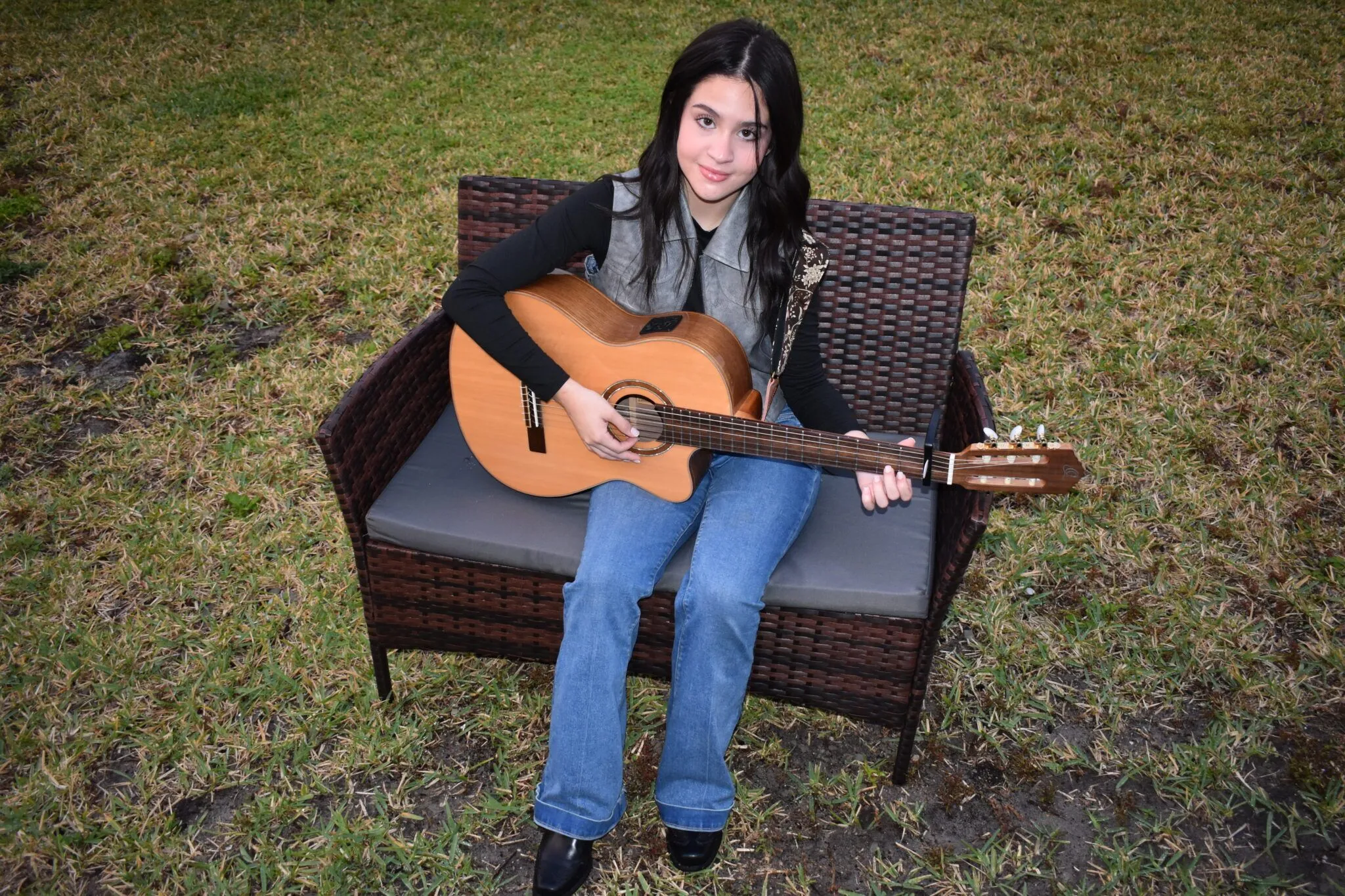
Yaeli "Yaya" Santos is learning to play the guitar as part of her curriculum under the PEP scholarship.
She suffered a severe concussion with lingering symptoms that included migraine headaches, dizziness, dyslexia, and memory loss. She went from being a confident student who earned top grades to one who lacked confidence in herself and struggled to complete assignments and tests.
“My eyes did not catch up with my brain, so I couldn’t focus on what I was reading,” Yaya said. “I couldn’t take notes because it was like my eyes got stuck when I was reading and I couldn’t transfer things from the board to paper, pen to paper.”
Yaya was attending Trinity Christian Academy, a private school near her Deltona home, with the help of a Family Empowerment Scholarship for Educational Options (FES-EO) when she suffered her head injury in March 2023. Now, learning in the traditional classroom setting was no longer working.
“I needed an alternative education path that could support her recovery with flexibility for doctors’ appointments and therapies,” said her mom, Giselle Bory-Santos.
That path was created by the Florida Legislature, which around the time of Yaya’s injury passed House Bill 1 and created the Personalized Education Program (PEP) that comes with a Florida Tax Credit Scholarship. Both the FES-EO and the PEP scholarship are managed by Step Up For Students.
The PEP scholarship provides an Education Savings Account (ESA) for students who are not enrolled full time in a public or private school.
Yaya graduated from the eighth grade at Trinity Christian then transitioned to the PEP scholarship for high school.
This allowed Giselle, the resource officer at Trinity Christian, and her husband, Rafi, a math professor at Full Sail University in Winter Park, Florida, to homeschool Yaya and tailor her education by spending the scholarship funds on various approved education-related expenses.
“PEP truly gives parents the chance to find the right educational path for their child’s unique journey,” Giselle said.
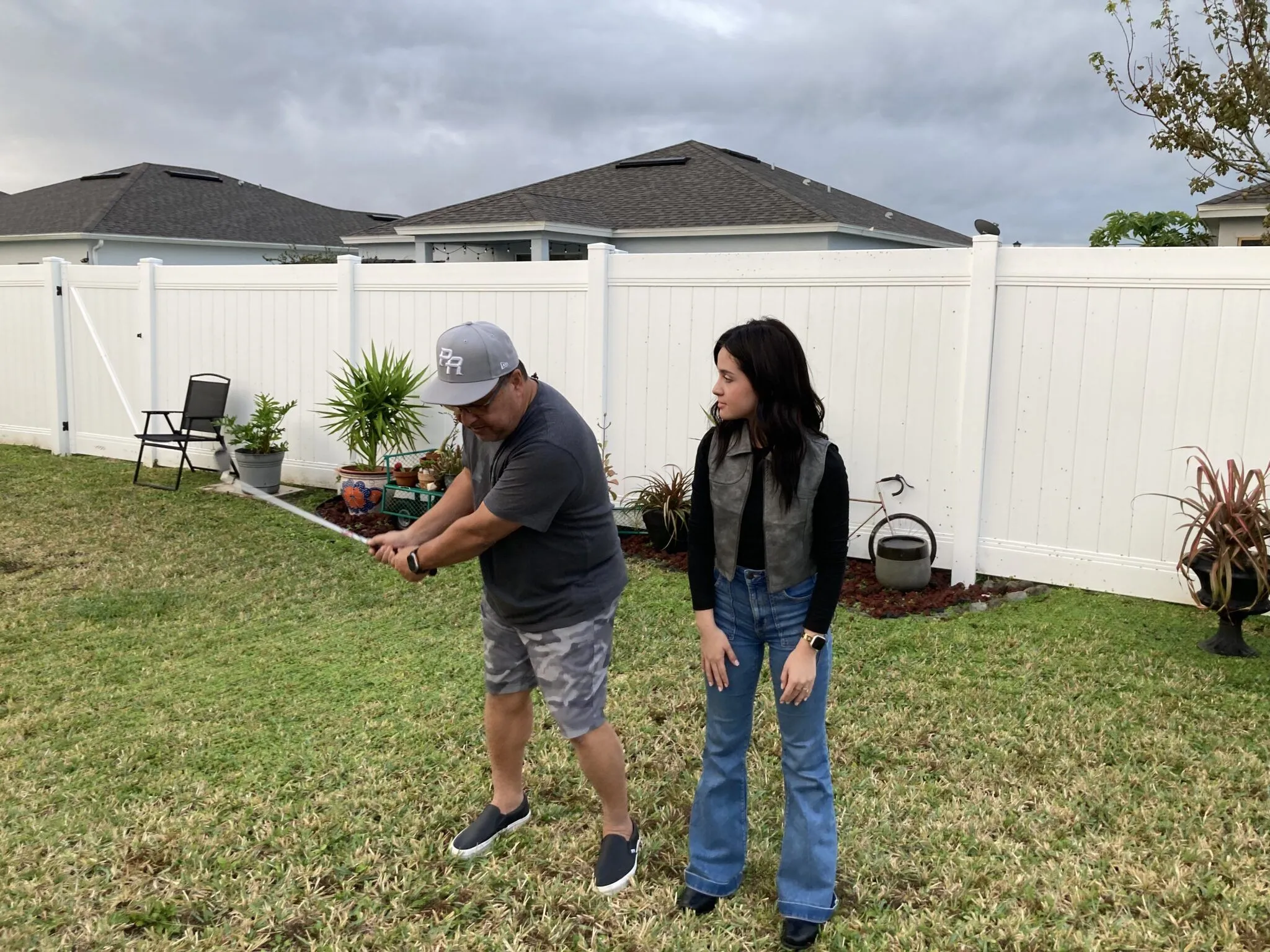
Yaya, working on her swing with her dad, Rafi, is learning golf as her physical education requirement.
Yaya moved to the PEP scholarship for the 2023-24 school year and enrolled in Florida Virtual School Flex. Now educated at home, Yaya could adjust her class schedule for appointments with her physical, occupational, and vision therapists. She could also work at her own pace without the pressure of completing a test by the end of the period.
She incorporated music into her curriculum and learned to play the guitar. Instead of gymnastics for her physical education requirement, she took up the safer sport of golf.
“I’ve officially retired from gymnastics,” she joked.
The PEP scholarship also allowed Yaya to dual enroll at Daytona State College, where she is working toward an associate degree in liberal arts.
With the help of her therapists, Yaya has been able to return to the classroom setting at Daytona State. Her professors, aware of her learning challenges, allow her more time to take tests and complete assignments. The result is a 3.94 GPA.
“I've been able to tailor my education and personalize it to who I am as a learner,” Yaya said.
Yaya has a 4.0 GPA in her high school studies. She will be 16 this spring when she graduates from both high school and Daytona State.
Next year, she will head to the University of Florida, where she plans to study sports and media journalism. Her goal is to eventually earn a master’s degree in media journalism from Full Sail University and a doctoral degree in professional communications from Florida by the time she’s 21.
“She is determined,” Giselle said.
Yaya said she was skeptical when her mom first raised the idea of home education. A self-described social butterfly, Yaya enjoyed attending school with her friends. Yet, she knew it was time for a change.
“My new normal was unique,” she said.
And the PEP scholarship, she said, was just what she needed.
“The word ‘personalized,’ I can’t think of a better one to sum it up,” she said. “Sometimes students excel when there are no boundaries to how they can learn. Being homeschooled opened opportunities for me.
“Who would have known that, after I had the concussion, that my school could no longer accommodate where I was at in my learning journey because of my health? Who would have known that this scholarship would have opened, and I would have been the first 10,000 students to receive it? Crazy. Now that is not normal.”
One of Yaya’s therapists suggested she keep a journal and write down her thoughts and feelings. A common theme during her recovery was the support she received. She often heard the phrase “you got this” as she struggled during therapy or with schoolwork.
So, Yaya wrote and recorded a song that incorporated her faith, her hard work and the support she received along the way. It’s called, “You Got This”:
“My thoughts fell apart
On the way to the ER.
In despair and fear,
He spoke into my ear
Time will heal your pain.
Take some time away.
You got this, you got this.”
Yaya still suffers from the effects of her concussion. Migraines come and go, and she can still become confused, but she’s learned to cope and compensate. She said she has far more good days than bad.
“The PEP scholarship is a blessing, and it changed my life, and it changed my family's life,” Yaya said.
“I would not go back and change anything about what I'm doing for school now. I've been able to find my dreams, my passions. I've been able to see that life outside of high school is going to be okay. The goal is to graduate and be successful, and that’s what I’m doing.”
 At the annual Florida School Choice Conference and School Choice Summit, attendees got their customary sendoff from Jim Horne, a former state senator, state education commissioner and pioneer of the state’s charter school movement.
At the annual Florida School Choice Conference and School Choice Summit, attendees got their customary sendoff from Jim Horne, a former state senator, state education commissioner and pioneer of the state’s charter school movement.
“We were charged to be laboratories of innovation,” he told the audience of school leaders in his keynote speech. “I challenge you to step out of the proverbial box. If you don’t innovate, you will stagnate.”
So far, charter schools have resisted the forces of stagnation. A report from the National Alliance for Public Charter Schools shows charter schools added 83,000 new students during the 2023-24 school year, as enrollment in other public schools shrank.
This school year, they added thousands more students in Florida. Recent figures from the state Department of Education show statewide charter school enrollment topped 400,000 during the 2024-25 school year.
That growth comes two years after state lawmakers passed House Bill 1, which allowed universal education choice scholarship eligibility and created the Personalized Education Program, a flexible scholarship for parents who fully customize their children’s education.
The legislation unlocked new opportunities for charters to heed Horne’s call to serve as laboratories of innovation by providing a la carte classes and services to scholarship students who did not attend public or private school full time. Need AP chemistry or calculus? No problem.
So far, five charter school organizations have partnered with Step Up For Students to offer individual courses to scholarship families, with more in the works.
“I think it’s a great idea and something that fits right into the charter school realm,” said Karen Seder, director of educational standards at Kid’s Community College, which operates three schools, including one that includes middle school, in Riverview, a southeastern suburb of Tampa.
The schools expect to begin offering courses soon after leaders decide what might work best. Seder said it might be easier to offer electives first and add core academics after seeing how things work out.
Though she sees the ability to help part-time students as a win for everyone, she sees the need to protect charter schools’ uniqueness, which comes from their ability to offer strong organizational cultures and coherent, specialized programs, for example, STEM, music or programs for students with learning differences. However, she called the push to maximize options for as many students as possible “the right mindset” for society.
“Ultimately, when you and I are no longer working and need somebody to take care of us, all these kids are going to be the ones responsible, so it shouldn’t matter to us if they’re homeschool or private school or public school or charter school or wilderness school, she said. “We need to make sure we’re raising kids that have the best education that we can, and our public dollars should be going to all of our kids.”
Gabriel Lynch III is new to his role as an education choice advocate. Though in essence, he’s been doing it nearly all his life.
He’s a product of both private and homeschooled education. He’s attended brick-and-mortar schools and studied virtually.
Along the way, Gabriel, 19, has become an ordained minister, a motivational speaker, an accomplished pianist, and a published author.
Those wondering about the benefits of education choice need only listen to Gabriel.
“School choice changed my life to who I am today,” he said.
Today, Gabriel is a college freshman majoring in music at Seminole State College in Lake Mary. His education from kindergarten through high school was supported by scholarships managed by Step Up For Students, from the Florida Tax Credit Scholarship to the Family Empowerment Scholarship for Educational Options to the Personalized Education Program (PEP), which he used to homeschool in 2023-24, his senior year of high school.
“I want kids to have the same experiences I had,” he said.
That’s why Gabriel joined the American Federation for Children (AFC), an organization that strives to bring education choices to families nationwide. Gabriel was recently accepted into AFC’s Future Leader Fellowship, a year-long internship program that will prepare him to meet with lawmakers around the country to promote education choice.
Read about Gabriel's story here.
A number of Step Up For Students alumni advocate for AFC. One of them, Denisha Merriweather Allen, founded Black Minds Matter and serves on Step Up For Students' governance board. Gabriel is the first to have benefited from a PEP scholarship. The scholarship, which began during the 2023-24 school year, is an education savings account (ESA) for students who are not enrolled full-time in a public or private school. This allows parents to tailor their children’s education by allowing them to spend their scholarship funds on various approved, education-related expenses.
Gabriel’s mom, Krystle, used PEP to homeschool Gabriel and his two brothers, Kingston (eighth grade) and Zechariah (sixth grade).
A longtime advocate for education choice, Krystle and her husband, Gabriel Jr., who live in Apopka, want to take control of their children’s education. PEP allowed them to tailor the curriculum for each son.
“They have different learning paths,” she said.
Krystle is ecstatic that her oldest son is following in her advocacy footsteps.
“This has been something that has been on my heart for many years, and to see him carry on the message, that's exactly what I've always dreamed of,” she said.
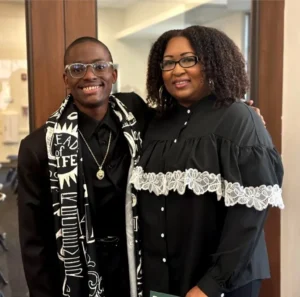
By joining the American Federation for Children, Gabriel is following in Krystle's footsteps as an advocate for education choice.
Gabriel said school choice helped mold him. Attending a faith-based school led him to become an ordained minister and a public speaker. Using the PEP scholarship for piano, guitar, and voice lessons fostered his love of music and helped shape what he hopes to be his career path. He wants to be a composer.
“There are so many things I am right now because of school choice,” Gabriel said. “I think it’s because my parents put me where I fit best because even when I was in private school, I could fit in. I found my group, I found my clique, and that's why I say it really changed my life.”
Gabriel is eager to share his story with lawmakers in states that don’t have education choice. Last year, advocates from the AFC Future Leaders program volunteered on the front lines of the fight to support education choice legislation in Nebraska.
“It’s giving parents options to choose where their kid fits best,” he said. “that’s what I will tell them. I think that would be amazing for those states that don't have school choice options.”